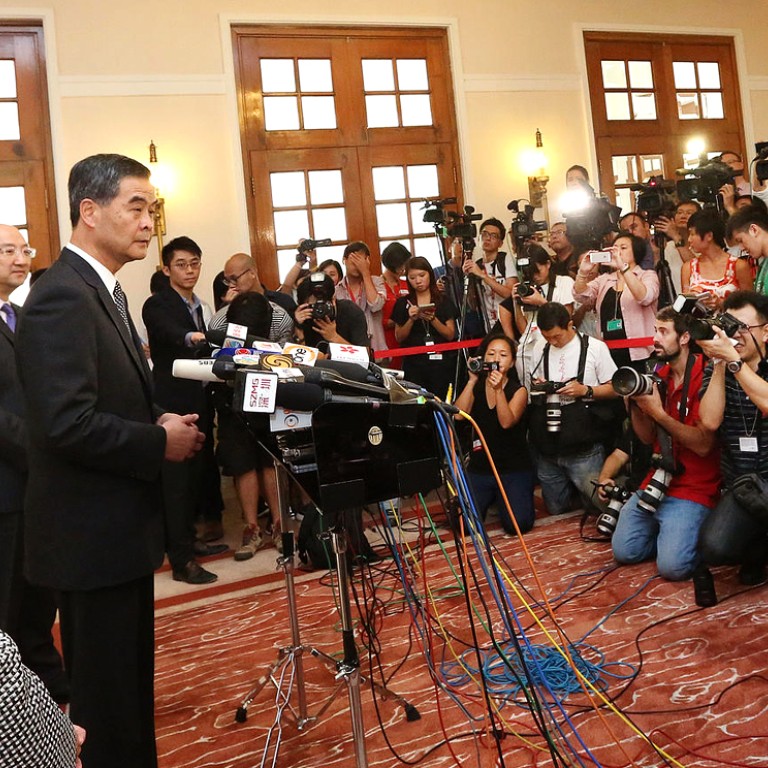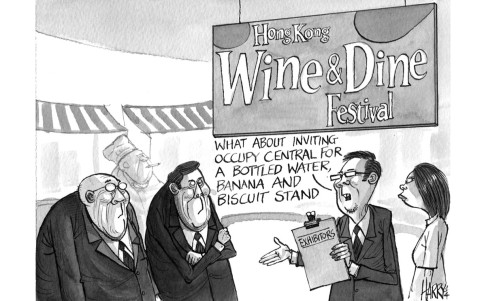
CY Leung puts student talks back on table but insists Beijing won't back down
But Beijing's election rules here to stay, he insists; police accused of beating protester suspended
The chief executive expressed hope yesterday that talks between top officials and student leaders could start next week in an effort to resolve the political impasse that has paralysed parts of Hong Kong and divided the community.
But Leung Chun-ying again rejected any possibility of Beijing backing down on the stringent framework for the 2017 chief executive election that triggered almost three weeks of widespread sit-ins and protests.
His comments came amid news that seven police officers alleged to have beaten Civic Party member Ken Tsang Kin-chiu early on Wednesday had been suspended.
At a rally in Admiralty, Occupy organisers and student leaders called on protesters to drop hostility towards the police and stick to the principles of non-violence.
Leung said talks with the students had "to be based on the Basic Law and the decision by the National People's Congress Standing Committee". The decision ruled out public nomination of candidates, which is central to the students' demands.
"There is no issue of making a compromise or not. We can't turn something unlawful into lawful," Leung said.
He suggested a university president serve as moderator for the talks, which could last more than one round.
Leung insisted that the talks and the clearance of protest sites were separate matters, and did not rule out clearing more sites during the negotiations.
Alex Chow Yong-kang, of the Federation of Students, said the group was willing to resume dialogue. The federation would accept a university president as moderator, but would also be open to a retired chief justice such as Andrew Li Kwok-nang.
But Chow said it was "unreasonable" to ask protesters to go home before the talks were over. "If [Leung] is offering to talk but at the same time ordering police to clear the scene violently, the people will know how sincere he is."
The government plans to launch a second round of consultation on political reform in the fourth quarter of the year.
Asked if a "supplementary report" could be submitted to Beijing to reflect the outcome of the talks, Leung said it would be "hard to argue" that the central government was not aware of the protesters' demands.
The government's renewed effort to engage students came a week after top officials called off a meeting with protest leaders on the eve of proposed talks.
Civic Party lawmaker Alan Leong Kah-kit said he doubted Leung's motives for re-opening the talks. "It's important for [Leung's] lack of sincerity to be exposed to both the Hong Kong public and the world by this so-called dialogue," Leong said.
Bank of America Merrill Lynch estimated the protests were causing a loss of HK$105 million per day to the economy.
"If we assume the Occupy Central movement causes a 10 to 15 per cent drop on tourism-related revenue, tourism contribution per day will drop by HK$26 million to HK$39 million," it said. A 2 per cent hit on private consumption would translate into a drop of HK$72 million.
The investment bank cut the forecast for Hong Kong's economic growth this year from 2.3 per cent to 1.9 per cent and lowered the forecast for next year from 2.5 per cent to 2.1 per cent.


